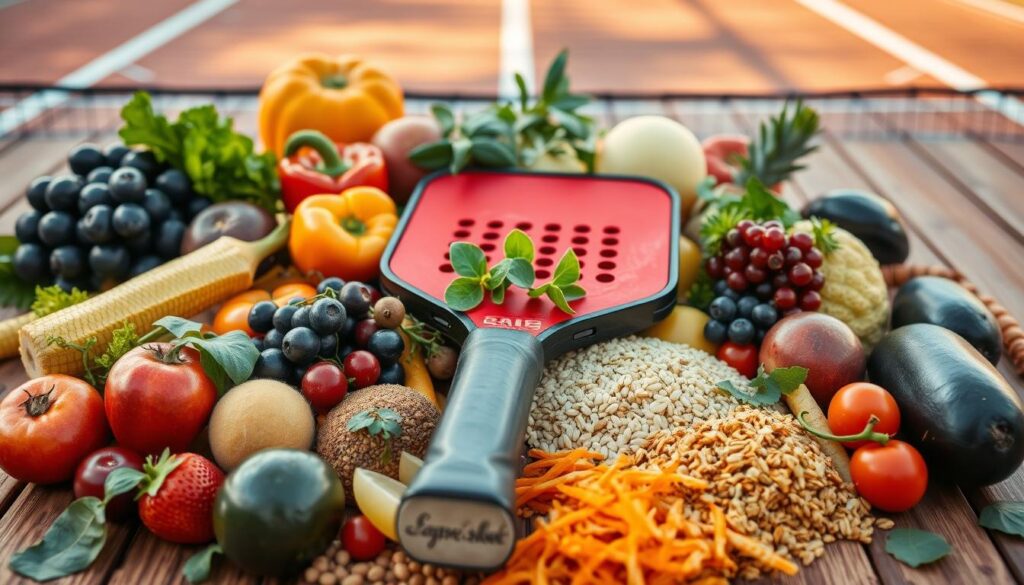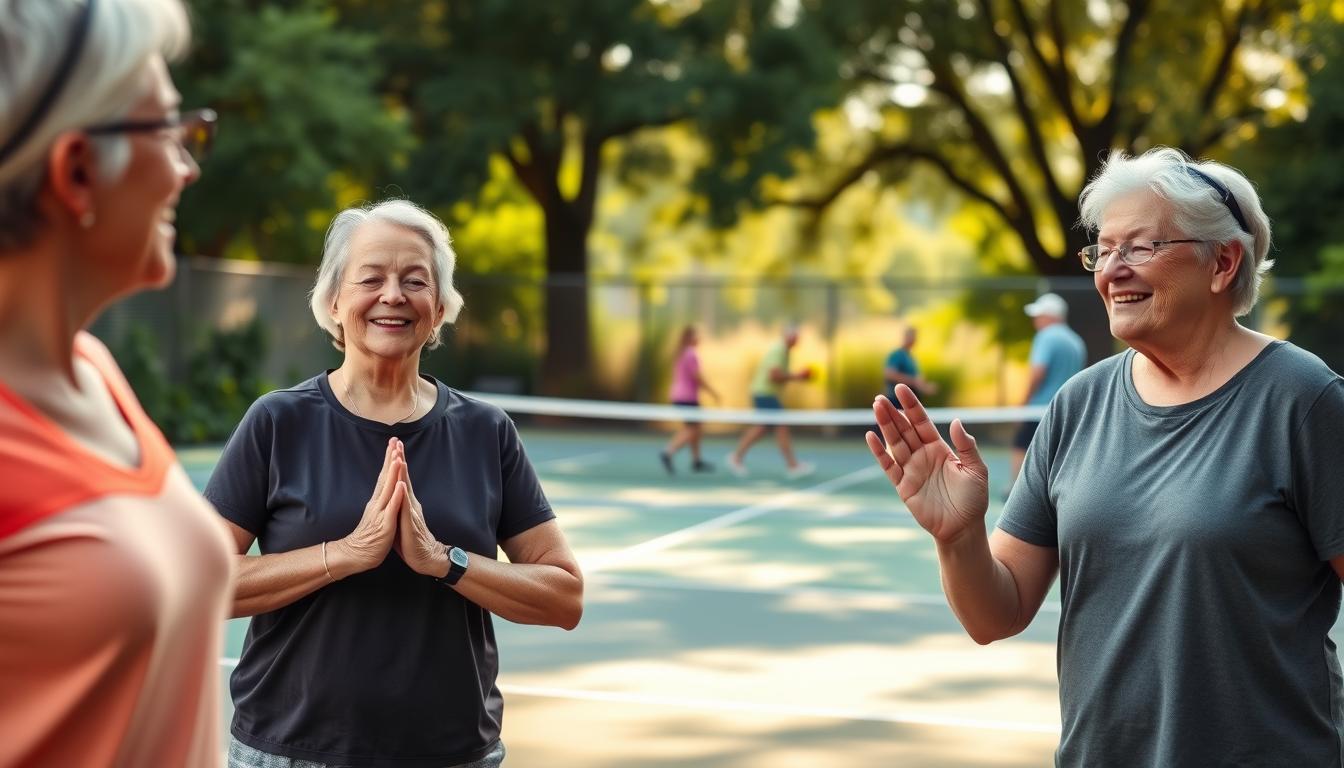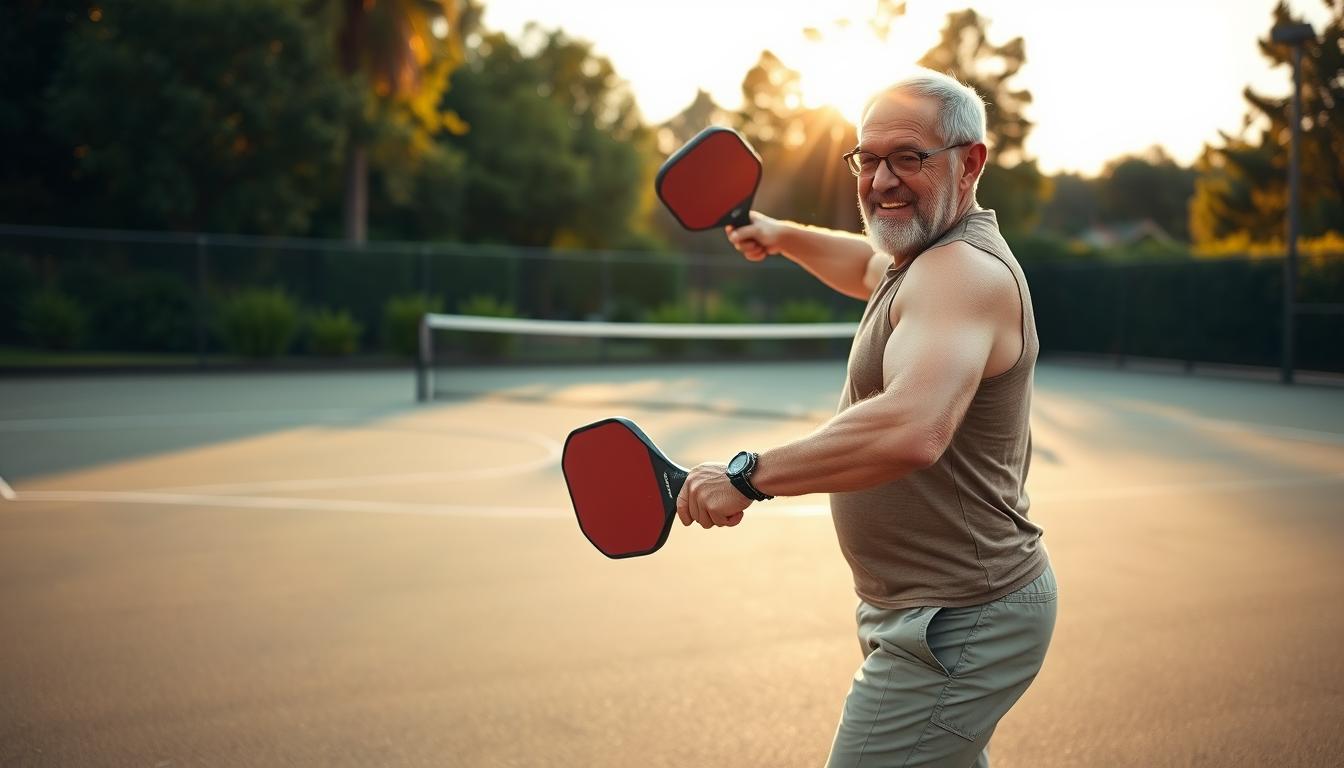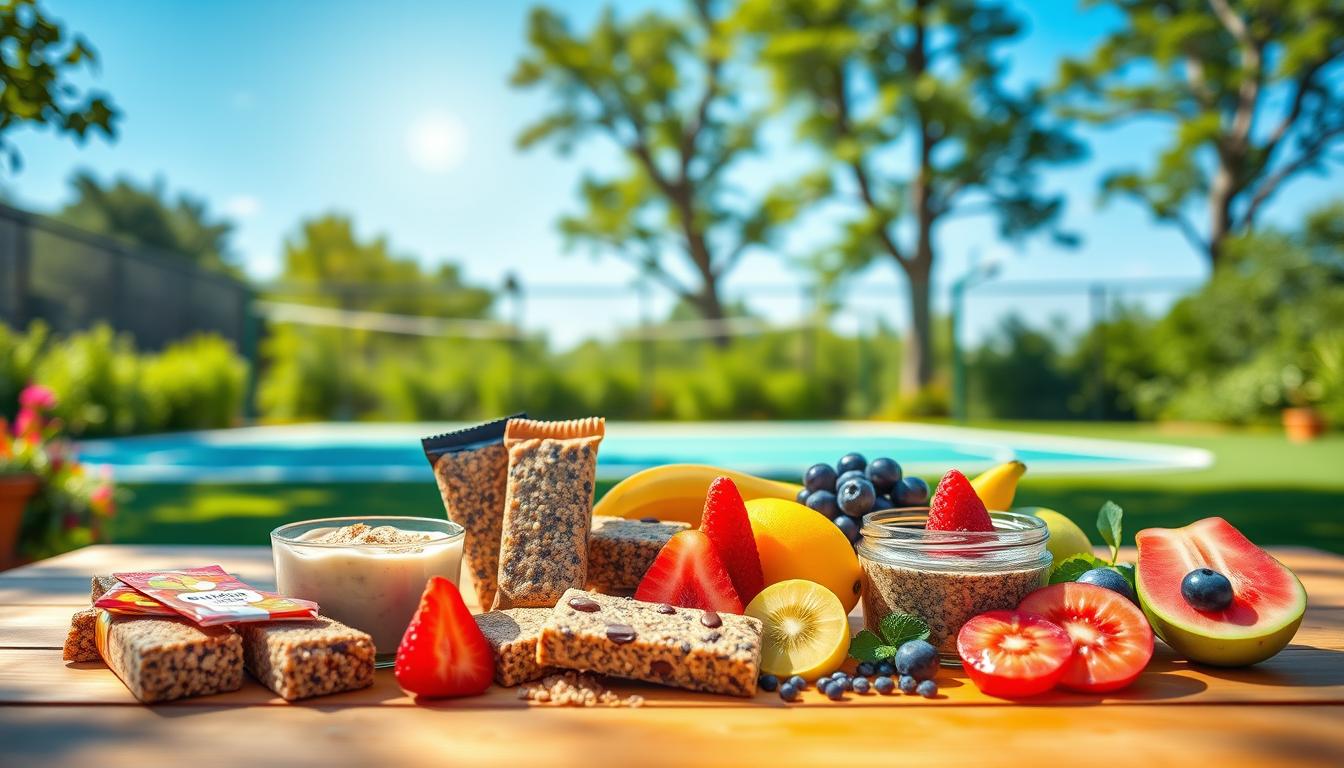Are you ready to challenge the notion that aging limits your athletic potential? For pickleball players over 50, adopting a vegan training regimen can redefine what is possible on the court. As you embrace the exhilarating benefits of pickleball, understanding the vital role of nutrition is essential for maximizing athletic performance.
This section explores how a well-planned vegan diet caters to the unique needs of older athletes. It ensures you enjoy not only the game but also the numerous health advantages it offers. Let’s dive into the recipe for a vibrant and effective training plan.
Understanding Pickleball and Its Benefits for Older Adults
Pickleball is a sport that combines tennis, badminton, and ping pong. It’s fun and easy to play, making it great for seniors. The game is played on a smaller court, which is easier on the body compared to other racquet sports.
Playing pickleball offers many benefits for older adults. It helps improve heart health by providing moderate exercise. This can also boost endurance and increase mobility.
Pickleball is not just about physical health; it’s also a social activity. It helps players form friendships and feel part of a community. This social aspect encourages seniors to keep playing, benefiting their physical and mental health.

Adding pickleball to your routine can be a fun way to stay healthy and active. It’s a great way for older adults to enjoy their time while improving their overall well-being.
The Role of Nutrition in Pickleball Performance
Nutrition is key to better pickleball performance, especially for those over 50. The right foods boost energy during games and help with recovery. Knowing what to eat is vital for improving your game.
Nutritional Needs for Pickleball Players
To play your best, focus on balanced nutrition. Important parts include:
- Carbohydrates: They give you energy, especially when playing long.
- Proteins: They help repair and grow muscles, aiding in recovery.
- Micronutrients: Don’t forget vitamins and minerals for strong bones and health.
Impact of Diet on Performance and Recovery
The right food boosts your game. A balanced diet cuts down on tiredness and keeps you focused. After playing, eating the right mix of carbs and protein helps muscles heal. This also lowers injury risks.

Essentials of Vegan Nutrition for Athletic Performance
Knowing about vegan nutrition is key for top athletic performance, especially in dynamic sports like pickleball. A well-thought-out vegan diet can give all the nutrients needed for energy and recovery. It also clears up common myths that vegan diets are lacking.
The right mix of nutrients boosts physical skills and keeps health in check.
Key Nutrients in a Vegan Diet
A vegan diet for athletes needs several important nutrients:
- Proteins: Plant-based proteins like lentils, chickpeas, and quinoa are great for muscle repair and growth.
- Healthy Fats: Omega-3s from chia seeds and walnuts help reduce inflammation and aid in recovery.
- Vitamins and Minerals: Vitamins B12 and D, iron, calcium, and zinc are vital for energy and metabolic functions.
Common Myths about Vegan Diets and Athleticism
Many false beliefs surround vegan diets and sports performance. Some common myths are:
- Insufficient Protein: People think plant-based diets lack protein. But, with the right choices, athletes can get enough.
- Low Energy Levels: Some believe vegan diets cause tiredness. A well-planned vegan diet keeps energy levels high.
- Inadequate Recovery: Worries about recovery and muscle repair exist. A balanced vegan diet supports recovery as well as any other diet.
Vegan Training Planning Pickleball 50+
Planning your vegan training for pickleball over 50 needs a clear plan. It helps you reach your goals. You must look at your skills and adjust for your age, like energy and recovery.
Having clear goals helps you improve your game and stay healthy. It keeps you focused on what you want to achieve.
Setting Goals for Training
Make your goals SMART: specific, measurable, attainable, relevant, and time-bound. You might want to get better at serving, last longer in matches, or get stronger. These goals guide your training.
Creating a Balanced Training Schedule
Your training schedule should mix skill drills, match play, and rest. It’s important to keep your heart healthy, stay flexible, and build strength. Remember, rest is key to avoid injuries, especially as you get older.
Change your schedule as needed. It should fit your body’s needs and abilities.
Pre-Match Vegan Nutrition
Good nutrition before a game is key for pickleball players. It helps them stay energized and focused. Eating the right vegan foods can improve performance and speed up recovery. It’s vital to plan meals and snacks well to get the most out of your game.
Best Vegan Foods to Eat Before Pickleball
Choosing the right vegan foods is crucial. Here are some top picks:
- Fig bars are a great source of carbs, giving quick energy.
- Bananas are full of potassium, helping prevent muscle cramps.
- Whole-grain toast is a complex carb source, perfect for lasting energy.
Hydration Strategies Pre-Game
Don’t forget about staying hydrated before games. Athletes should drink plenty of water before matches. Aim for at least 16-20 ounces of water a few hours before playing.
This keeps you hydrated and boosts your performance. It also helps prevent fatigue. Good hydration is essential for a great game.
In-Match Nutrition Strategies
Keeping up a good game in pickleball needs the right nutrition during play. Players over 50 can really benefit from energy snacks and staying hydrated. The right food and drink choices can boost energy, keep you going, and help you play better.
Energy-Sustaining Snacks During Play
Choosing the right snacks during play can really help your game. Quick and easy snacks like energy gels, banana bites, or carbs are best. They give you the energy to stay quick and focused without upsetting your stomach. Think about packing:
- Granola bars
- Trail mix
- Fruit slices
- Rice cakes with nut butter
These snacks help you keep your energy up during matches. This way, you can play your best.
Importance of Hydration While Playing
Drinking enough water is as important as eating snacks during a game. It helps prevent tiredness and keeps muscles working right. Players should drink water often, especially during breaks. If you sweat a lot, try drinks with electrolytes to replace lost salts.
Drinking water and electrolytes together is key to staying at your best. It helps you stay competitive and play well all game long.
Post-Match Recovery and Nutrition
Recovering well after a game is key for athletes. After a tough pickleball match, it’s important to refuel. Good nutrition helps fix muscles and boosts energy, keeping players at their best.
Vegan Meal Ideas for Recovery
Choosing the right vegan meals for recovery is crucial. Here are some great options:
- Plant-based protein shakes: These are quick to digest and packed with essential nutrients.
- Lentil salad: Rich in fiber and protein, this meal helps with muscle repair and replenishes glycogen stores.
- Quinoa bowls: Combining quinoa with vegetables and legumes provides a complete protein source for effective recovery.
Importance of Protein for Muscle Recovery
Getting enough protein after a game is vital. Plant-based proteins are full of amino acids for muscle repair and growth. Foods like tempeh, chickpeas, or edamame are great for recovery. They help athletes meet their goals while staying vegan.
| Vegan Meal | Protein Content (g) | Benefits |
|---|---|---|
| Plant-based protein shake | 20-30 | Quick absorption, enhances recovery |
| Lentil salad | 18 | High in fiber, replenishes glycogen |
| Quinoa bowl | 24 | Complete protein source, balanced nutrition |
Incorporating Supplementation for Enhanced Performance
Supplements can really help vegan athletes improve their performance. A good vegan diet covers most nutritional needs. But, supplements can fill in the gaps for better health and sports skills. It’s important for vegan athletes to pick supplements that match their training and goals.
Common Vegan Supplements for Athletes
Many supplements are used by vegan athletes. These include:
- Protein Powder: Plant-based protein powders, like pea and hemp, give essential amino acids for muscle repair and growth.
- Creatine: This supplement boosts strength and power, helping with quick movements during sports.
- Electrolytes: Electrolyte powders after exercise replace lost minerals, helping with hydration and recovery.
- Vitamin B12: Key for energy, this vitamin is often needed in vegan diets.
Monitoring Supplement Efficacy
It’s key to check how well supplements work for all athletes, especially vegans. You can track your performance and see if you recover faster. Keep a log of what supplements you take and how they affect your training. Always talk to a healthcare provider before trying new supplements to avoid side effects.
By choosing supplements wisely, vegan athletes can get better results and reach their goals faster.
Age Considerations in Vegan Training
Aging affects how much energy we need and our metabolism. As we get older, our bodies change in ways that affect how we eat and exercise. For athletes over 50, it’s key to adjust vegan training to fit these changes. This helps improve performance and keeps us healthy.
How Aging Affects Energy Needs
Older adults often need less energy because of less muscle and a slower metabolism. This means they might burn fewer calories during workouts and daily life. It’s important for older pickleball players to carefully check their energy needs, especially on a vegan diet. Eating foods rich in nutrients helps meet calorie needs, supporting performance and recovery.
Adapting Training Techniques for Older Players
Changing training methods helps older athletes perform safely and effectively. Low-impact activities like swimming or cycling are good for training. These changes help with physical limitations and lower injury risk. It’s also important to listen to your body and rest enough to keep playing pickleball for a long time. Knowing when you’re tired helps tailor training to match your energy levels.
Injury Prevention and Management
It’s key to prevent injuries in pickleball, especially for older players. Sprains, strains, and tendonitis can really slow you down. To stay healthy and play well, you need good management strategies.
Understanding Common Injuries in Pickleball
Many players get hurt in pickleball. Sprains happen from sudden moves or falls. Strains come from overstretching muscles. Tendonitis in the wrist and elbow is common from doing the same thing over and over.
Knowing about these injuries helps you prepare better. It makes your training and playing safer.
Tips for Injury Prevention on the Court
There are ways to avoid these injuries. Here are some tips:
- Warm Up: Always start with a good warm-up. It should include dynamic stretches to get your muscles and joints ready.
- Strength Training: Add strength exercises to your routine. They help make your muscles stronger and more stable, which lowers injury risk.
- Cooldown Protocols: After playing, do some cooldown exercises. They help your muscles recover and stay loose.
- Regular Check-ups: See a fitness expert regularly. They can check your health and give you advice tailored just for you.
Building Mental Resilience for Competitive Play
Mental resilience is key in sports, especially for athletes over 50. It can greatly improve performance. Older players face special challenges, so it’s vital to use mental practices that help them stay strong under pressure.
Mental Practices to Enhance Performance
Visualization and mindfulness are great for building mental toughness. Visualization helps players imagine success and prepare for games. Mindfulness keeps them focused and calm, reducing stress.
Adding these practices to daily routines can greatly improve performance in tough situations.
Stress Management Techniques for Players Over 50
Managing stress is critical for mental resilience. Deep breathing, yoga, and muscle relaxation are effective. These activities help players relax and stay positive, leading to better performance.
It’s important to focus on mental health. This ensures players stay focused and calm during games.
Functional Exercises for Pickleball Players
Functional exercises are key for pickleball players to get better. Doing strength training helps build the muscles needed for the game. These exercises boost power, stability, and agility.
Strength Training Essentials
It’s important to work on core, legs, and shoulders. These muscles help with movement and hitting power. Here are some exercises to improve strength:
- Squats for leg strength and stability
- Planks to enhance core stability
- Shoulder presses for upper body strength
Aerobic Conditioning for Endurance
Aerobic workouts help players stay energetic during games. Interval and circuit training boost endurance and keep workouts fun. Try these activities:
- High-intensity interval training (HIIT) to boost cardiovascular fitness
- Circuit training that combines strength exercises with cardio
- Continuous running or cycling for improved overall endurance
Adding balance and flexibility exercises helps on the court and prevents injuries. A regular training plan with these exercises can greatly improve your game and health.
Community Engagement and Social Benefits of Pickleball
Pickleball is more than just a game; it’s a way to connect with others. It brings joy to many older adults by helping them make friends. Playing in local leagues and clubs makes them feel part of a community.
This sense of belonging boosts their mental health. It makes them feel happy and well.
The joy of pickleball comes from the friendships formed. Players help each other and share tips. This creates a supportive environment.
These connections last long, making players feel they belong. Pickleball fights loneliness, making it a key part of life for many.
Playing pickleball regularly keeps people active in their communities. It improves both physical and mental health. As pickleball grows, so do the chances to meet new people.
Resources for Continued Learning and Support
For those looking to boost their vegan training, online resources are key. Websites, blogs, and social media groups are great for learning. They share tips on nutrition, exercise, and wellness for pickleball players over 50.
These platforms help players stay fit while following a vegan diet. They offer insights and advice tailored to your needs.
Best Online Resources for Vegan Training
- Forks Over Knives: A treasure trove of recipes and nutrition info for plant-based living.
- Plant-Based News: Stay current with vegan lifestyle news, studies, and trends for athletes.
- The Vegan Society: Offers nutrition resources, webinars, and articles for athletes.
- NutritionFacts.org: Videos and articles by doctors on vegan diet health benefits.
Finding Local Vegan and Pickleball Communities
Joining local vegan and pickleball groups is vital for support and encouragement. It’s a chance to learn from others and build friendships. Players gain from shared experiences and advice, boosting skills and motivation.
Look for community engagement through:
- Local farmers’ markets and vegan restaurants
- Social media groups for vegan athletes
- Meetup events for pickleball
- Community centers with classes and workshops
Conclusion
This article highlights key points for vegan training planning for pickleball players over 50. It shows how nutrition, training, recovery, and mental strength are crucial. These elements help improve performance and lead to a healthier lifestyle.
Adopting a vegan diet requires understanding nutritional needs. This ensures energy and muscle recovery, allowing players to enjoy the game. Vegan training planning is vital for the health and longevity of older athletes.
The path to mastering pickleball on a vegan diet is empowering. By using the right training and nutrition, players can excel physically and mentally. They show their strength and stamina on the court, enjoying the sport well into their golden years.




